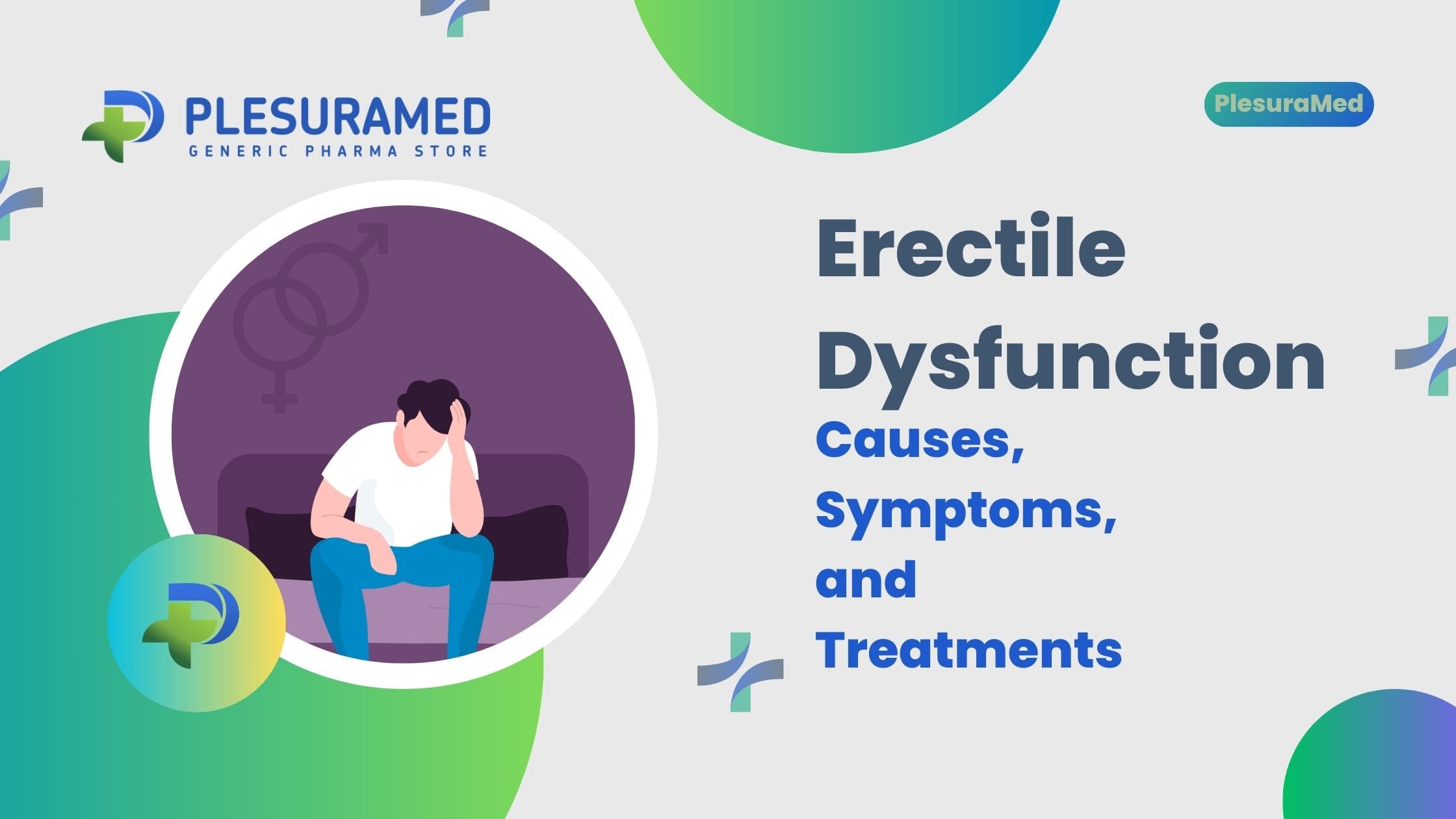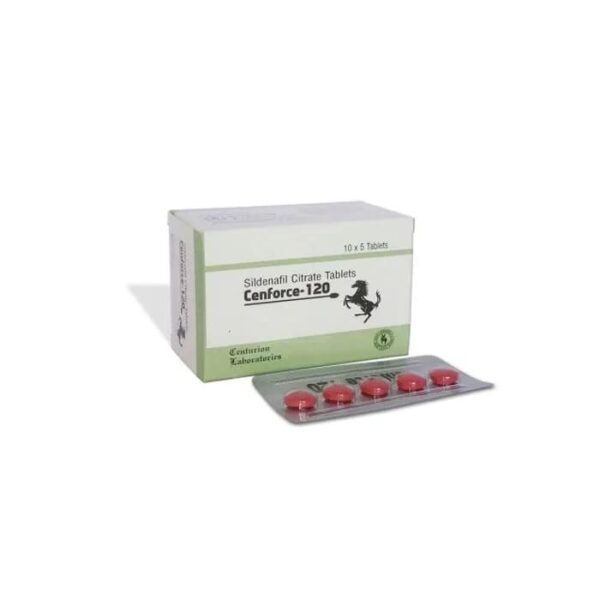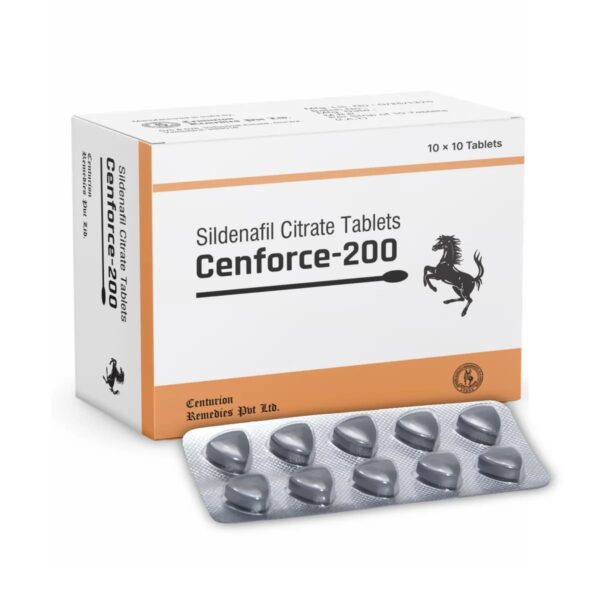Erectile Dysfunction: Causes, Symptoms, and Treatments

Erectile dysfunction (ED) is a common disorder that affects men’s sexual performance. This is a condition that is considered treatable but still has an impact on millions of men in the world. The condition, in this case, is about the difficulty to achieve and sustain an erection that is sufficient for sexual performance that one feels satisfied with. The problem is that in men, the loss of erection may be transient or it may be chronic and in the latter case, the male person might need to solve some deeper problems that are either physical or emotional.
This article is devoted to enlightening you about the causes, symptoms, and how efficient the treatments for erectile dysfunction are by which you can increase your sexual health awareness and consequently take the right actions.
What is Erectile Dysfunction?
When you talk about erectile dysfunction, it is not just a case of a person having difficulty in maintaining an erection as it may be a result of illness. It is referred to as a medical problem when it happens often, persists typically for several weeks or even longer. ED is the primary cause for the loss of self-esteem and the incidence of problems in relationships and, eventually, lower quality of life. Despite this, a large percentage of men, through lifestyles and medical procedures that are effective, can fight against the development of ED.
Common Causes of Erectile Dysfunction
ED can be a condition caused by a combination of physical, emotional, and lifestyle factors, getting to the root of the cause is the way to find a successful treatment. Are you ready?
1. Physical Causes
Mainly, these are causing erectile dysfunction, especially with elder men:
- Cardiovascular disease: The blood flow to the penis is reduced rapidly because of the direct impact on the arteries.
- Diabetes: High glucose in the blood may lead to the destruction of the cells and the blood vessels, and thus, cause ED.
- Obesity: Overweight causes hormonal imbalances and vascular problems.
- High blood pressure and cholesterol: These two conditions can both cause damage to blood vessels.
- Hormonal imbalances: The lack of testosterone levels is of great importance to decreased libido and impotence.
- Neurological disorders: Diseases such as a stroke and Parkinson’s can hinder the brain’s signals to the sexual organs.
- Medications: Certain classes of drugs including antidepressants, antihypertensive drugs, and some sedatives are capable of impacting sexual function negatively.
- Substance abuse: Alcohol, tobacco, and illicit drugs can also work against sexual performance and libido.
2. Psychological Causes
The state of mental health largely influences sexual performance:
- Stress and anxiety: Tensions from work, money, or relationships can reduce desire and performance.
- Depression: A lack of mood is usually accompanied by a decrease in sexual interest and difficulties with the erection process.
- Performance anxiety: The terror of failure in bed can carry on a dysfunctional cycle.
- Relationship problems: Quarrel or lack of intimacy may result in sexual dissatisfaction.
Symptoms of Erectile Dysfunction
Main Symptoms of ED are (a) troubles (b) getting or keeping an erection. Without a doubt, there is no problem in changing the sentence’s word order for the sake of variety. The presence or absence of sexual issues is another argument that we can have, in relation to other illnesses or their absence within oneself.
- Reduced sexual desire
- Trouble maintaining an erection during intercourse
- Delayed or premature ejaculation (occasionally linked)
- Emotional distress or embarrassment
If these symptoms are happening quite frequently and place a considerable burden on your private life, it is indispensable to seek medical advice from the corresponding doctor.
How Is Erectile Dysfunction Diagnosed?
Regarding this issue, most probably, a doctor might use one of the following options:
- Conduct a physical exam
- Review medical and sexual history
- Order blood tests to check hormone levels
- Suggest ultrasound to evaluate blood flow
- Recommend a psychological evaluation if mental health issues are suspected
Many times when a patient utilizes his/her first appointment with the healthcare provider, the doctor sets up a plan of action.
Treatment Options for Erectile Dysfunction
It is very important to know that it is not a case of being treatable or not but rather the category of the treatable aspect. Where there has been abuse of something, the very first step should be to avoid contact with that specific thing. Basically, anything that comes from man is both good and bad because in all these technological advances there is some degree of goodness or badness.
1. Lifestyle Changes
Sometimes even small changes can lead to a noticeable improvement in your condition:
- Quit smoking: Tobacco affects circulation and nerve sensitivity.
- Exercise regularly: Boosts blood flow and testosterone.
- Maintain a healthy diet: Focus on whole foods, fruits, veggies, and lean proteins.
- Lose excess weight: Reduces the risk of vascular and hormonal problems.
- Limiting alcohol consumption: A lot of drinking may lead to a decrease in sexual performance.
- Stress management: Attempt doing yoga, meditating, or going to counselling.
2. Medications(erectile dysfunction pills)
Plenty of oral medications that the FDA has approved are in the market so that they are useful in the correction of erectile dysfunction as follow:
- Sildenafil (Viagra)
- Tadalafil (Femalefil)
- Vardenafil (Snovitra)
- Avanafil (Avana)
- Dapoxetine(Duratia)
The basic function of these drugs is to cause blood to be pumped more extensively into the penis, which can then be brought to life. They are most effective if taken before the sexual activity and require arousal in order for them to work.
3. Psychological Counseling
One has to resort to therapy if most of their erection problems are psychosocial related e.g. anxiety and depression. Furthermore, cognitive-behavioral therapy (CBT) and couples counseling are the common forms of therapy that are used in cases of psychogenic Erectile Dysfunction (ED).
4. Vacuum Erection Devices
They are designed to suck blood into the penis and create an erection. Inexperienced users might need the help of a constrictor to maintain the erection.
5. Penile Implants
However, when it comes to the unresponsive still men, they may have to resort to surgical implants that are inserted into the penis and can be loaded by pressing the switch.
6. Hormone Therapy
Hormone replacement therapy (TRT) is the most likely drug to be a solution in the case that the ED is a result of low levels of testosterone. Regular checks are required for the administration of TRT to avoid side effects.
7. Alternative Supplements
For men who seek healthier and safer alternatives to solve sexual problems, various options like Horny Goat Weed are made readily available by the market.
- Horny Goat Weed: It is thought to have an effect on the strengthening of blood flow and therefore improving libido.
- Ginseng: Can work with energy and sex drive.
- L-arginine: The raw material may give rise to the NO production.
Always consult a doctor before using supplements. Some may interact with prescription medications or have adverse effects.
Permanent Cure for Erectile Dysfunctions
The best solution would be to go to a doctor who could diagnose and treat the underlying problem.
ED can be permanently cured if the cause for it has been eliminated.
Problems such as stress, anxiety, smoking, obesity, and poor lifestyle habits that lead to ED can be changed with better lifestyle.
Diagnosing and treating diseases like diabetes, heart disease, or hormone imbalances may help to recover normal function.
Therapy, changing lifestyle, and sometimes surgery (penile implants) are the more lasting solutions.
Medication support to manage symptoms while it is very seldom that they will do for complete recovery.
Related Products
-
Cenforce 100 Mg
Price range: $55.00 through $230.00 -
Cenforce 120 Mg
Price range: $75.00 through $235.00 -
Cenforce 150 Mg
Price range: $100.00 through $290.00 -
Cenforce 200 Mg
Price range: $76.00 through $340.00
Can Erectile Dysfunction Be Reversed?
Yes, in most cases. If the cause of erectile dysfunction is due to bad habits, stress, or the side effects of drugs, changes and proper treatment can result in total recovery. The sooner you solve the problem, the better it will be.
When to See a Doctor
The piece of advice is to talk to a healthcare provider in the event of:
- Your erection problems haven’t stopped
- ED is having a negative impact on your relationship
- You experience symptoms of low testosterone (e.g., tiredness, mood swings)
- You’re in doubt about your health condition such as diabetes or heart disease
Seeking professional assistance can help you enjoy more pleasurable sex and achieve an improved overall health condition.
Read Also : Is Tamsulosin Like Viagra? Knowing the Main Distinctions
Conclusion
There is no need to feel isolated when you encounter erectile dysfunction. It is a disease that affects millions of men and is commonly a warning of other health issues. Owing to the fact that there are many treatments available, the vast majority of them are proven to be successful whether the cause is physical, mental, or over the way of life. The right plan—regardless if it’s taking medicine, going through therapy, or changing your lifestyle—can manage ED efficiently for you to regain your confidence and intimacy.
FAQs
1. Can an erectile-dysfunction suffering man satisfy a woman?
Definitely! Feeling good in a relationship doesn’t depend on the intercourse solely. In addition to emotional closeness, foreplay, communication, and other sexual activities can be a source of pleasure and connection.
2. How would you help a man who has problems with his erection?
It is important to be understanding and do not rush the process. You should also suggest visiting a doctor, the participation in some conversation on the phone, and lots of worthwhile ideas. Besides, men should start following healthy ways to live as an alternative treatment.
3. Some men will have erectile dysfunction occasionally. What can be done in such cases?
Yes, brief difficulties occur quite frequently and are unremarkable. A man who is impotent for an extended period should book an appointment with a doctor and discuss the issue.
4. Is it okay for men to take certain steps in dealing with ED if this problem occurs abruptly?
No need for hysteria! Sudden ED can be related to reasons like stress, fatigue, or short-term health conditions. You can see a doctor and get diagnosed for treatment in case it persists.
5. Is it possible that sleep disorders can lead to ED?
Affirmative, as sleep apnea or disturbed sleep dramatically reduce testosterone and cause problems in sexual function, the chances of getting ED would be higher.





